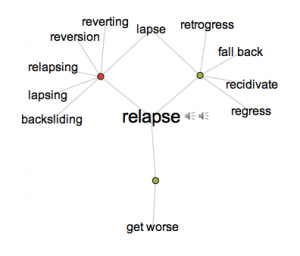Relapse: Expect It and Respect It
What? Why you should take the blame NOT!
April 8, 2013Migraine Help (Interview with Jill Cohn, D.C.)
April 15, 2013graphic from visualtheasaurus.com
I didn’t like needles as a kid, but was fascinated at how casually my grandfather would stick one into himself.
He was a diabetic, and in those days the only treatment was an insulin injection. I suppose anyone would become casual too, doing something like that day in, day out.
In last month’s column I compared diabetes with addiction, saying that once you’ve been diagnosed with diabetes, you become responsible for managing the disease. This is also true of alcoholism and other addictions.
When you have a condition like diabetes – or an addicted response to alcohol, drugs or other temptations, the treatment protocols call for changes in behavior that have been routine parts of your life. This is not easy to do, so relapse is common.
If you are like most people who are handed these diagnoses, you believe at some level that you’re going to be the exception to the rule and won’t have to follow the recommendations. You might believe you can master this situation your own way. And you might want to do it by yourself.
This is one reason that the relapse rates for Type 1 diabetes and drug addiction are similar and significant (30 to 50% of diabetics regress and 40 to 60% of addicts backslide). It turns out that people with hypertension and asthma actually relapse more often (50 to 70% for each).
But even though diabetes and addiction have some things in common, there is an important difference: People with diabetes usually aren’t blamed for relapsing, much less for being sick in the first place.
But people with addictions are held accountable, by others as well as by themselves.
After almost 30 years as an addiction specialist, I think this is a problem. We’re still splitting the body from its mind, even though we know better.
1. Sympathy if it’s physical.
Situations that are clearly physical soothe our sympathy buttons. For example, when was the last time you called the office and said, “I’m taking the day off today but I’m not sick?” Noooo, not unless you’re the boss, and even then – isn’t it easier if you have something specific, like an achy throat or a cough, to justify your sick day?
2. Suspicion if it’s mental.
Many of us are uncomfortable with uncertainty and mystery. Addictions and many chronic conditions have behavioral components. The consequences sneak up on us, whether we’re the one with the problem, or we love the one with the problem. The tendency is to not want to deal with the confusion and worry. So we avoid, hoping everything will be better tomorrow.
That’s not likely.
So relapse is actually to be expected, but the person with the problem – and the people around that person – don’t always know it and feel confused about what they’re experiencing – so they try to take care of things themselves with limited understanding of what they’re dealing with.
Few medical conditions are so stable that you’ll follow the same treatment protocol for years. Your fitness routine needs to adjust and change over time, so why not your recovery plan?
In the process, don’t let this attitude get in your way:
“My mind is a dangerous neighborhood. I can’t go in there alone.”*
Because most addictions create problems with your brain’s perception of reality, trying to fix this all on your own is like being your own heart surgeon. Addiction treatment specialists are committed to helping you get the care you need, and can support you in creating your best plan for a healthy and safe recovery.
~ ~ ~
New class to help you get where you want to be, 3rd Tuesday each month, I will introduce you to an elegant and powerful process for achieving your goals. Apply for a free discovery session to discover if the class, or any of my private services, could be a fit for you.
* This quote is a variation of the original, from write Anne Lamott, who wrote an article in 1997 published by Salon, titled “My mind is a bad neighborhood I try not to go into alone.”



1 Comment
[…] ended last month’s column with this quote, but I really blew […]